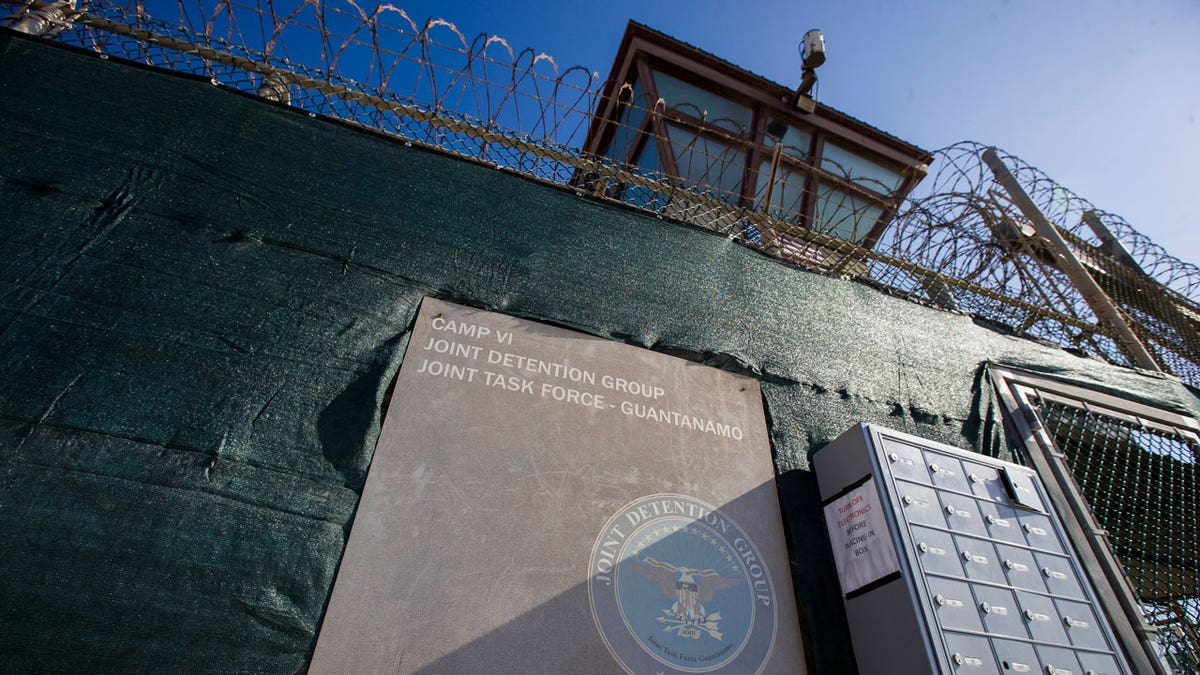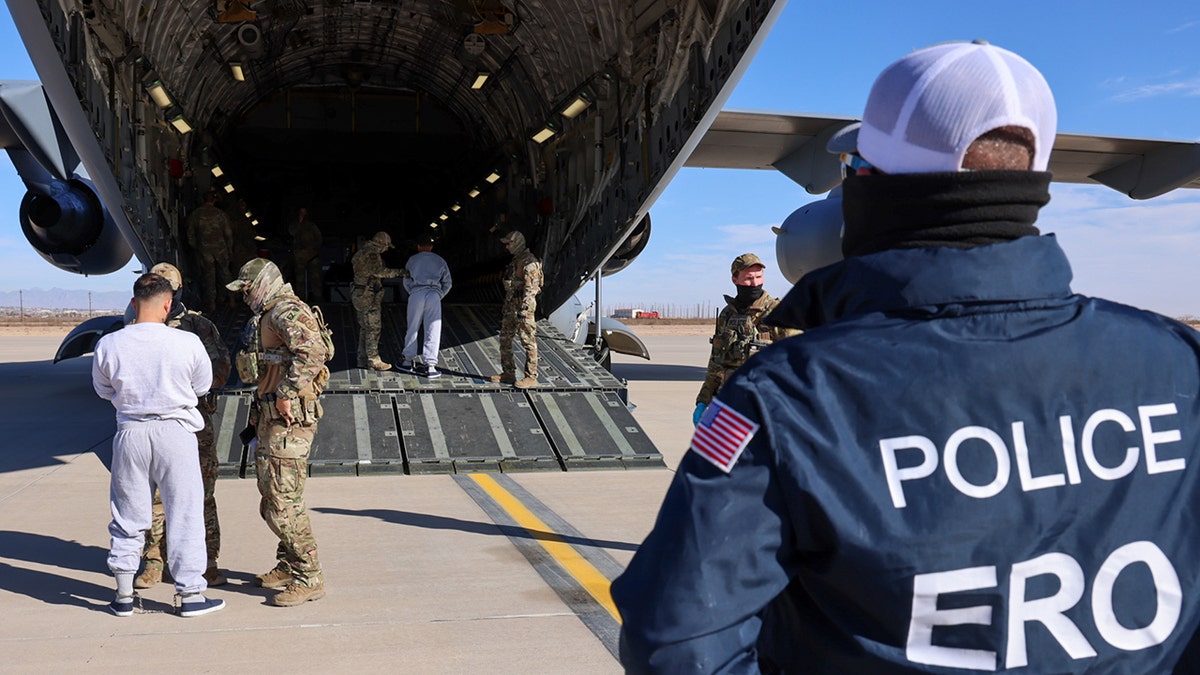The Trump administration’s plan to detain some of the most dangerous illegal immigrants arrested in the United States in Guantanamo Bay, Cuba, could raise legal concerns and challenges, which could slow efforts to deport them to their home countries, experts say.
President Donald Trump has instructed the Pentagon to prepare the facility to house up to 30,000 “criminal illegal aliens” at the U.S. military base. Flights to the facility began this week.
Around 150 Marines are at the Naval Station and have set up tents for around 1,000 migrants in the other part of the installation. But those facilities with latrines and showers are not yet ready for an onslaught of 30,000 migrants as promised by Trump and Defense Secretary Pete Hegseth.
TRUMP-ERA SOUTHERN BORDER SEES MIGRANT ENCOUNTERS PLUMMET BY OVER 60% AS NEW POLICIES KICK IN

A migrant prepares to board a flight to Guantanamo Bay. The detention of illegal immigrants at Guantanamo could raise legal challenges, experts say. (Department of Homeland Security)
Among the uncertainties of the plan, what’s inevitable is that those detained will most likely file petitions for a writ of habeas corpus, which asks a judge to review the legality of the prisoner’s detention, said Eugene Fidell, a visiting lecturer at Yale Law School who teaches a course on military law and Guantanamo Bay.
“Nothing has changed in terms of that basic guideline, which means that the writ of habeas corpus, which is protected by the U.S. Constitution in so many words, applies there,” Fidell told Fox News. “And what that means is that the people who are being taken to Guantanamo as part of the administration’s current effort are going to have access to the United States District Court.”
The first 10 criminal migrants who arrived this week will be held under U.S. Immigration and Customs Enforcement (ICE) control in a separate wing of the detention facility where the 15 remaining 9/11 military combatants, including Khalid Sheikh Mohammed, the principal architect of the 9/11 terror attack, are housed.

In this photo reviewed by U.S. military officials, the control tower of Camp VI detention facility is seen on April 17, 2019, in Guantanamo Bay Naval Base, Cuba. (AP Photo/Alex Brandon, File)
The arrival of illegal immigrants to Guantanano will almost certainly result in legal challenges, wrote John B. Bellinger III, adjunct senior fellow for international and national security law at the Council on Foreign Relations.
“Unauthorized immigrants transferred (or threatened with potential transfer) from the United States to Guantánamo will file a vast array of legal challenges, providing a lot of business for the courts,” he wrote in an article published Tuesday. “Haitian and Cuban refugees previously held on Guantánamo—as well as many of the terrorism suspects—filed numerous suits challenging the detention and conditions, several of which were ultimately heard by the Supreme Court.”
Hegseth said the administration knows there will be legal challenges but that securing the border requires bold measures.
“You’ve got the hardened facility for Tren de Aragua, violent gang member types who need that kind of lock down. And then you have on the other side of the island of Guantanamo Bay Naval Station, a place built for migrants, for those who peacefully are going to be extricated out of the United States,” he said. “We know there will be legal challenges.”

Defense Secretary Pete Hegseth, right, pats Chairman of the Joint Chiefs of Staff Gen. Charles Q. Brown Jr., on his shoulder as he answers questions from reporters after arriving at the Pentagon on Monday. (AP Photo/Kevin Wolf)
“Here’s what we know. What President Trump knows is that border security and internal enforcement is national security. Because we were invaded for the last four years under Joe Biden,” Hegseth added. “Tens of millions of people entered our country. We have no idea who they are. We’re going to find those here illegally, prioritizing those with violent or sketchy past and use Guantanamo Bay as a transit way to remove them and send them back to their home country.”
Bellinger noted that all the prior cases by those detained at Guantanamo involved people detained outside the U.S. Those arrested in the U.S. will be able to file additional claims, he said.
“Unauthorized immigrants detained in the United States also have a right to counsel and to be visited by a consular official from their country of nationality,” he said. “Such immigrants may claim that their transfer to Guantanamo will interfere with their ability to exercise these rights.”
DOZENS OF ILLEGALS ARRESTED IN TRUMP’S HOME COUNTY IN FLORIDA
In 2008, a landmark U.S. Supreme Court decision gave anyone sent to Gitmo the right to habeas corpus, meaning anyone at Guantanamo can challenge the legality of their detention. The ruling has played a factor that has slowed the government’s ability to complete the prosecution of Mohammed and the other 9/11 planners.
“This is not a convenient venue,” said Fidell. “It’s not a venue that insulates the government’s activities from the oversight of the federal courts.”
Fidell noted that previous administrations have resisted efforts to get the federal court to exercise oversight of Guantanamo, resulting in a series of court cases, notably the U.S. Supreme Court case of Zadvydas v. Davis, noting that those cases dealing with the indefinite detention of illegal immigrants could apply.
“What you’re going to see is an intersection of habeas corpus law generally with the very robust body of law that has grown up over the years in the immigration field,” he said. “And the notion that people can be held for prolonged periods of time is one that I think is going to meet with a lot of resistance in the courts.”
TOM HOMAN CALLS DESIGNATING CARTELS AS TERRORIST ORGANIZATIONS A ‘GAME CHANGER’

This image shows migrants boarding a flight to Guantanamo Bay. (Department of Homeland Security)
In the Zadvydas case, the high court ruled that the plenary power doctrine doesn’t allow the indefinite detention of immigrants under order of deportation whom no other country will accept. The case stems from Kestutis Zadvydas, who was a resident alien in the U.S. and was ordered deported in 1994 because of his criminal record. Zadvydas was born to Lithuanian parents in Germany, but was not a citizen of either country, neither of which would accept him.
In 1995, he filed a petition for a writ of habeas corpus in a federal court, which was eventually granted and he was released under supervision. The government appealed and the ruling was overturned.
From 1991 to 1993 and from 1994 to 1996, part of the base at Guantanamo was used to house large numbers of Haitians and Cubans who fled their countries on boats and rafts to claim asylum in the U.S.
CLICK HERE TO GET THE FOX NEWS APP
In addition to legal challenges that could slow the deportation process, housing these migrants could cost taxpayers millions of dollars.
“There’s a theatrical dimension to this. But this is it. This is an operetta for which the seats are extremely expensive,” Fidell said. “We know that it is costing the taxpayers a fortune to keep Guantanamo open for the handful of people being tried by the military commission, as well as the even smaller handful of people who are simply being held pending repatriation or being sent somewhere that will accept them who are long-term detainees.”
“Congress is going to have to appropriate some money because it’s not going to be free for the taxpayers,” he added. “I think this is a battle that’s going to be fought out not at Guantanamo. It’s going to be fought out at John Marshall Place in Washington, D.C., where the federal court sits.”

